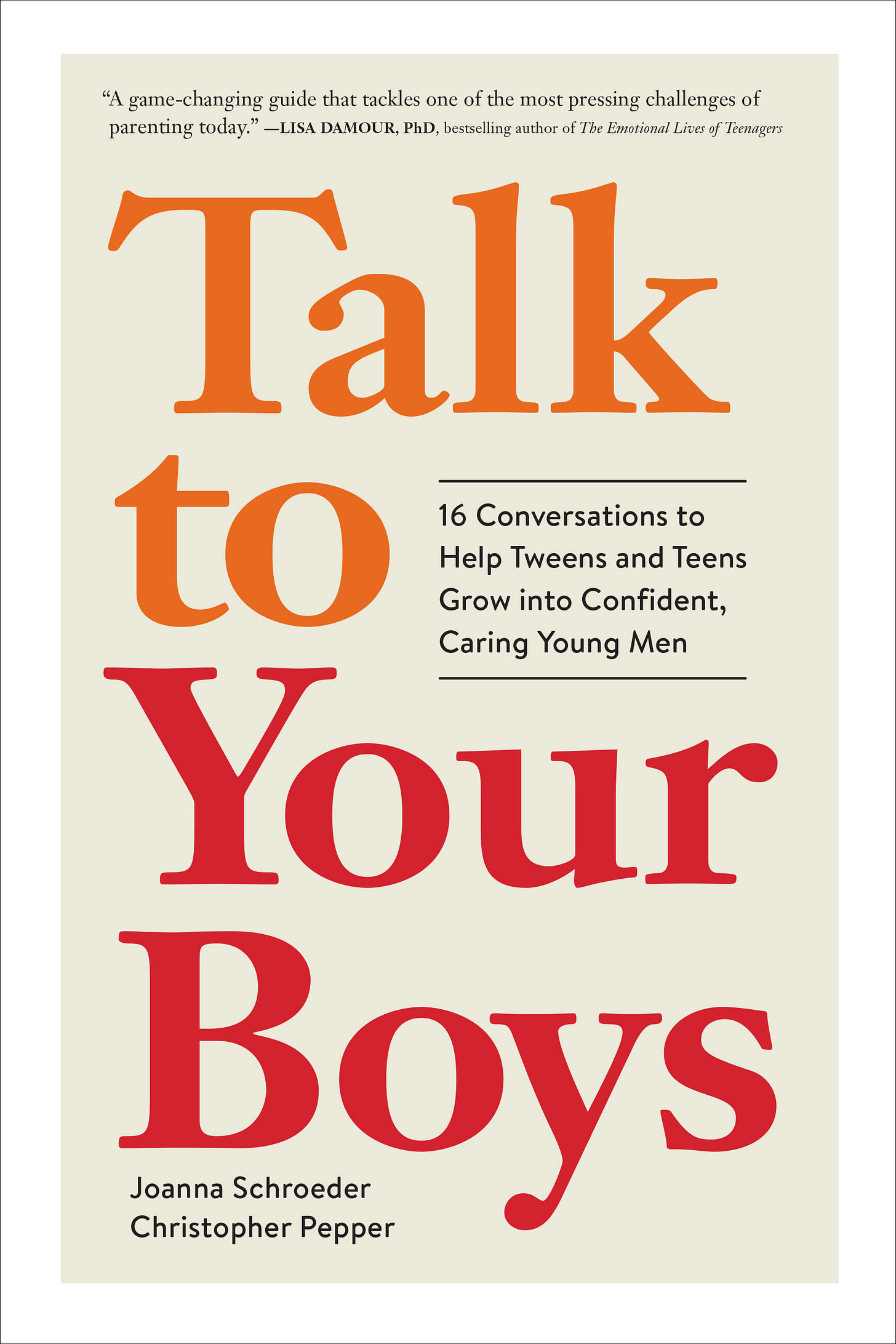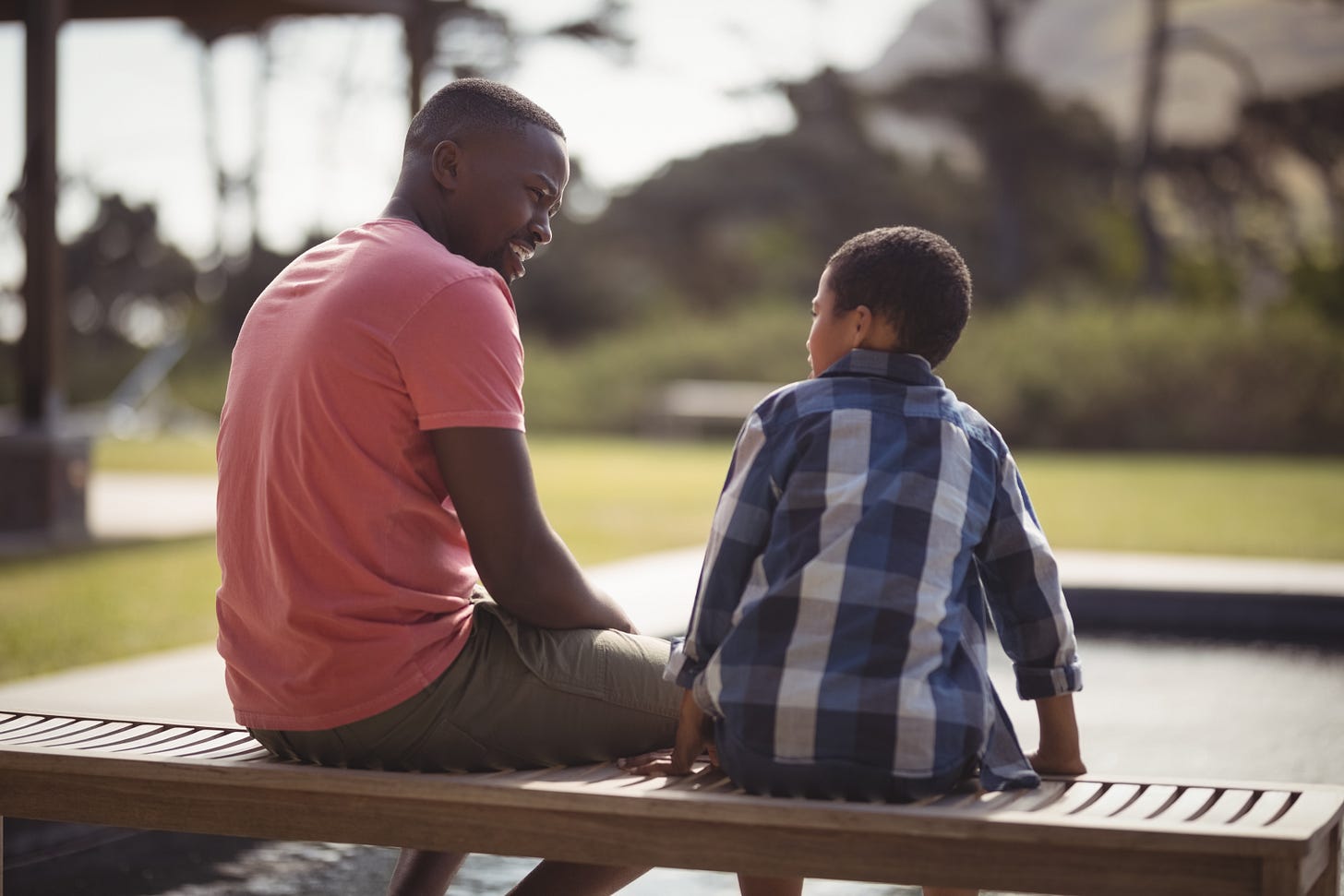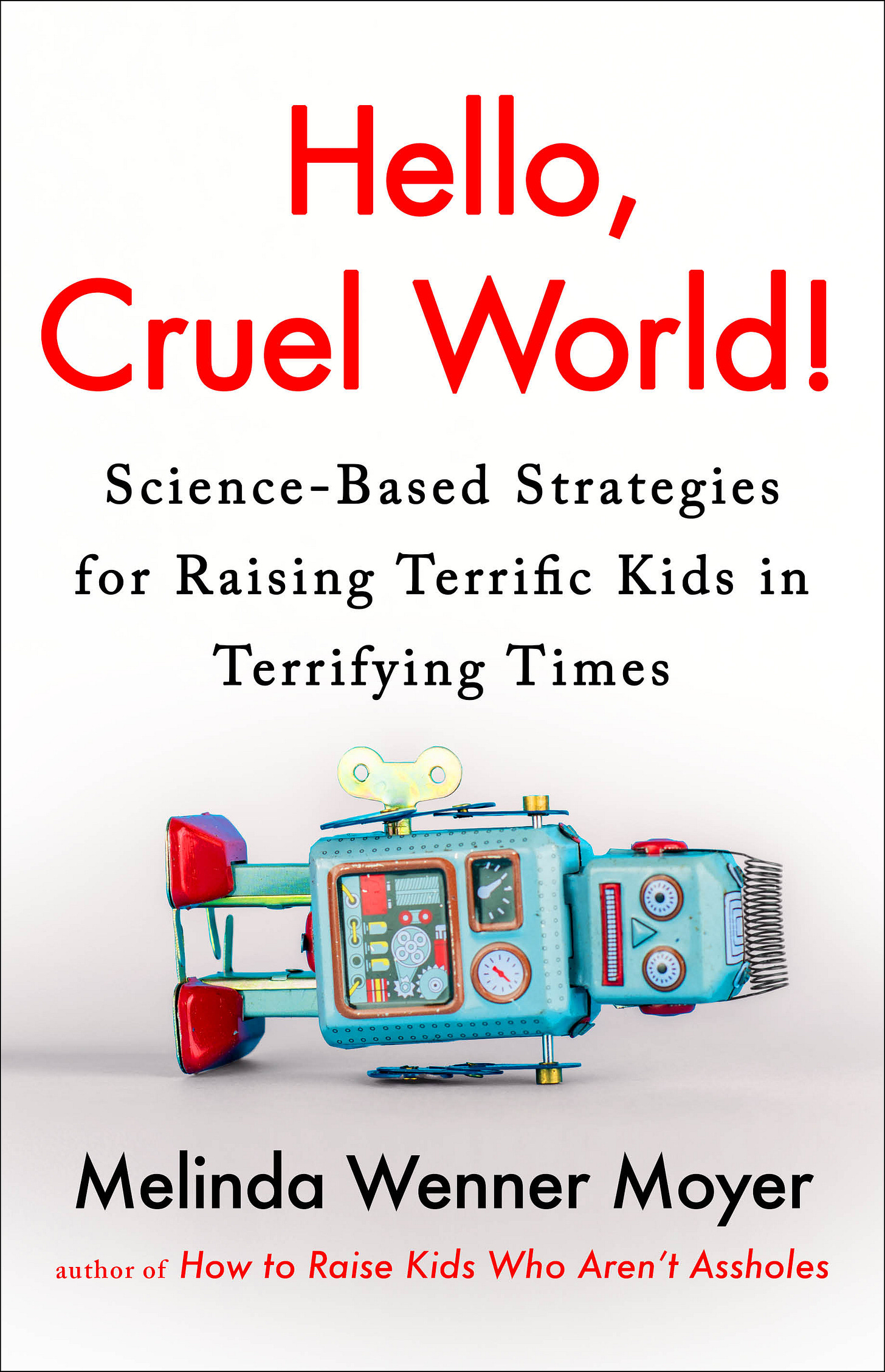How to Talk to Boys
A Q&A with authors Joanna Schroeder and Christopher Pepper
My Back-to-School Sale ends this Friday! Get 20% off a paid subscription FOREVER — that means you’re paying only $5.60/month or $56/year for access to all my content, including more than four years of paid archives.
Yesterday, a wonderful new parenting book came out that I am recommending to all parents of boys. It’s called Talk to Your Boys, and it’s written by writer and media critic
and youth educator (they also write the wonderful Substacks and , respectively).Talk to Your Boys is a thoughtful and highly practical guide to 16 essential conversations parents should have with boys about topics including sex, drugs, bullying, power, social media and consent. I read the book months ago and blurbed it, describing it as “a pragmatic guide I wish I'd had years ago — and one I'll be turning to again and again.” I meant every word.
I’m so excited today to be running a Q&A with Christopher and Joanna about some of the issues they cover in their book, but I highly, highly recommend that you pick up a copy and read the whole thing. It’s so good!!
Joanna and Christopher: What inspired you to write Talk to Your Boys?
Joanna: In my 20+ years of being a parent, I somehow became the mom other parents approach with tough or embarrassing questions about their kids. I think it’s because I’ve covered pretty much every off-limits topic in my writing career and had a wealth of expert sources to tap when I faced new challenges. For instance, a mom asked me how to explain where babies come from after years of telling her kids, “Dad gave me a seed and I swallowed it, and you grew in my tummy.” When her son accidentally saw some adult material on a friend’s phone in fifth grade, he was shocked and felt betrayed by his mom.
After countless situations like this on a wide variety of topics, I realized parents needed tools. I was also watching a crisis emerge among boys and young men and realized how badly parents of boys needed some support. All I needed was the right co-author to bring experience and insight.
A few years later, I met Christopher Pepper, a health educator who coordinates the Young Men's Health Groups in San Francisco public middle and high schools, a program that brings boys together to talk about their lives, their fears and much more. As a man, a dad of boys and former foster parent, I knew I’d found someone who could help me take my idea and make it even better.
Christopher: When Joanna asked if I wanted to collaborate on writing a book proposal, I knew right away that I wanted to say yes. I’d been coordinating a boys’ group program for several years, parenting my own sons, and thinking a lot about how we talk to young men about issues like consent and sexual harassment. I knew the world was ready to talk about raising more connected, caring boys, and I wanted to help facilitate those conversations.
One of the things you talk about is that it's normal for kids (perhaps especially boys?) to become less talkative in adolescence — but that this doesn't mean they don't want to talk to us at all. What are some signs we can look for that suggest a boy wants to connect?
Christopher: Teenage boys aren’t likely to come right out and say “Hey, I’d like to spend some time with you.” You may need to practice tuning into them, and looking for small moments where you might connect or talk together. One thing that can help is being curious about their interests, and stepping up to support them, which might look like taking them fishing, driving them to a concert, or taking them to a gaming convention even if you have little interest in those things yourself! One way to show you care is to be interested in the things your kids are excited about.
Joanna: I agree wholeheartedly with Christopher here. It’s rare that a tween or teen will sit down and ask to talk — and most parents who wait for an invitation to have a tough conversation might end up waiting a lifetime. Instead, they put forth little bids of attention, hoping we’ll pick up on them and engage.
Some of these bids are quiet, like lingering in the living room longer than usual at night or lurking near your desk when you’re working. Others are loud, like sighing loudly or clanking around in the kitchen, complaining about seemingly unimportant things.
No matter how awkward or irritating these bids may be, we need to respond to them. A simple, “Hey Bud, what’s going on?” can go a long way to showing support if you’re willing to truly listen.
How can parents talk about feelings with boys who might seem hesitant to open up about their feelings? Why is it important to do this?
Christopher: As a society, we don’t do a great job of encouraging boys to share their feelings openly — or making it safe for them to do so. Studies show that adhering too closely to a rigid definition of masculinity can be harmful to men’s health, in part because the belief that men should be stoic and independent often results in men not seeking help or support even when they really need it.
Joanna: In an ideal world, parents would start teaching kids how to identify their feelings, name them, and process them in a healthy way when they are toddlers, regardless of gender. But if you’re like many other parents who didn’t have the tools to do this — or it has stopped as your boys have gotten older — it’s not too late.
One of the best ways to do this is by modeling your own emotional process. While this is especially important for men, any parent or caregiver can make a difference.
One of the easiest ways to start is to talk about how you feel when you’re driving and another driver makes you angry. You can note that you’re angry and even share that you were tempted for a moment to give the middle finger or swear at the other driver. Yes, there’s a vulnerability to admitting this, but that’s also part of the lesson.
The key is to explain why you got angry and how you managed it. Maybe you took a deep breath or turned on the radio. Regardless of how you do it, modeling for your kid how you manage those big feelings helps them see their own feelings as manageable and teaches them those skills.
One suggestion in Talk To Your Boys is to use non-accusatory phrases to start conversations. One example might be:, “Hey, I’ve noticed you haven’t been seeing your friends as much lately. What’s up?”
There are dozens of examples of these in the book, but the key is to talk about what you’ve noticed rather than telling them how they’re feeling.
You offer some great suggestions for how to start conversations about pornography. Can you share a potential script here?
Christopher: Thanks for asking about this — it’s such an important topic to talk about, but most parents don’t know where to start. Here are two possible approaches we share in Talk To Your Boys:
Example 1:
"Many people your age are curious about bodies and sex, and that's perfectly normal. Sometimes people want to look at videos or pictures online to learn more about sex, but porn isn't a great source of accurate information. I wanted to share a book I picked up that might answer some of your questions, and also to let you know that you can ask me questions about anything you see online and I will do my best to answer."
Example 2:
"I know this may be awkward, but I think it's important. I've been hearing that a lot of people your age are looking at porn-either by accident or on purpose. I want to make sure that we've talked about it so that I can share some facts about porn and let you know that you can talk to me about this and we can discuss it anytime. You won't be in trouble."
Joanna: In addition to what Christopher noted, I will add that, by the time your kid is using the internet without you looking over their shoulder, they should be aware that there are many things online that are not appropriate for kids. They’re made for adults, and even some adults are uncomfortable seeing them. Remind your kids that they can show you or talk to you about anything they come across online that is confusing, upsetting or weird and that you won’t get mad or judge them.
As they get older, you can use a media literacy lens to talk to kids about porn. Encourage them to consider questions like: Who was this made for? Who profits off of it? How can we know the people in the video consented to sharing it? How do we know how these performers were treated or if they feel safe?
Your kid is likely not going to enjoy this conversation and will likely say, “I already know all of this!” You can reassure him that you know he probably does know it all, but that you want to discuss it anyway.
This not only offers them opportunities to better understand why porn exists, it can help them determine their own ethics when it comes to adult content. By bringing up the topic yourself, unprompted, you prove that you are a parent who can handle any conversation and will field any question without getting angry or rushing to take away your son’s phone and other devices.
You discuss the importance of talking to boys about social media memes and helping them distinguish between humor/edginess and worrisome/offensive content. Can you offer a few suggestions for parents who want to do this but aren't sure how?
Joanna: Christopher shares a fantastic catchphrase in the book that applies here: Get curious, not furious. In other words, ask questions and avoid making it seem like you doubt your son’s morality and don’t shout or get angry about what he is being shown. After all, social media companies can quickly guess your son’s age and start aiming their content (and their propaganda) at them when they’re young. It’s likely your boys didn’t do anything to “invite” offensive content into their FYPs.
One of our favorite exercises is to have regular discussions about which words and phrases are “bad words” and which are “harmful words.” Swear words are bad or against the rules, but harmful words go much deeper. They may harm someone’s self-esteem and even make them feel unsafe. Middle schoolers seem especially keen to say “off-limits” things — that’s why it’s key to teach them how to decide for themselves if their “edginess” could possibly do harm to someone else.
Christopher: Even more than memes, I worry about insults and slurs that are directed at people, over platforms like Discord or during online video game play. I think it’s important to remind boys that the people they are talking to can be profoundly hurt by their words, and to share your expectations about how your son talks to other people.
What's the biggest myth about raising boys that you'd like to debunk?
Joanna: Too often, it feels like parents just stop raising their boys around age 13. They may figure that boys have to learn things on their own — go out, get hurt, learn a lesson and come back stronger. “Go break a few hearts,” as the older generations used to say.
But for some boys, the hurt they may endure in an unprotected life could run deep, potentially causing trauma and/or destructive (or self-destructive behavior). Ultimately, boys deserve as much protection and compassion as girls.
Christopher: I always feel a little sad when I hear adults repeating old stereotypes about teenage boys or talk with dread about being around them. They are human beings who need our love, support, and guidance, and spending time with them can be a hilarious joy.






This book looks so good! My boys are almost 9 and 6 and I’m starting to feel my oldest become less talkative and involved with his friends but also do the bid for attention thing. I try really hard to answer all those bids. He likes to read next to me where we both read our books at night and he asks me questions then. And this morning he asked me if I would wake him up to watch The Summer I Turned Pretty series finale with me next week. That show has made me think a lot about teenage/young adult boys and as my husband is one of 3 brothers, I’ve also talked to my MIL a good bit about raising boys and how to talk to them.
Thank you so much for your support of this book and for your excellent questions!